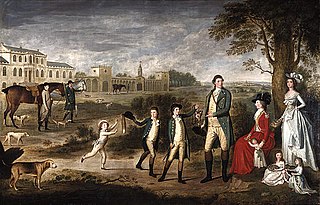This article may be confusing or unclear to readers.(March 2010) |
The Oliphant Baronetcy, of Newton, was a title in the Baronetage of Nova Scotia. It was created on 28 July 1629.
This article may be confusing or unclear to readers.(March 2010) |
The Oliphant Baronetcy, of Newton, was a title in the Baronetage of Nova Scotia. It was created on 28 July 1629.
The Oliphants of Newton and the Lords Oliphant were the two most influential branches of the Oliphant family in the 17th century.
Sir William Oliphant of Newton (Lord Newton), Lord Advocate of Scotland was father of the first baronet. Sir William Oliphant is credited with introducing the process of cross-examining witnesses in court, rather than the previous process of extracting testimonials from witnesses, which were then read out in court.
Their principal seat was at Newton, in the parish of Forgandenny. [1]
The Complete Baronetage [2] states that this baronetcy (in Nova Scotia was purchased on 28 July 1629; was sealed on 24 August 1629, is destined to heirs male whatsoever and is not evident in the Register of the Great Seal.
Thereafter the baronetcy devolved to the heir of the first baronet's grandfather, Thomas Oliphant of Freeland, whose ancestry has not yet been proved. In consequence, the baronetcy is listed as dormant as of August 2010.

A baronet or the rare female equivalent, a baronetess, is the holder of a baronetcy, a hereditary title awarded by the British Crown. The practice of awarding baronetcies was originally introduced in England in the 14th century and was used by James I of England in 1611 as a means of raising funds.
There have been 19 baronetcies created for persons with the surname Campbell, seven in the Baronetage of Nova Scotia and twelve in the Baronetage of the United Kingdom.
Nineteen baronetcies have been created for persons with the surname Hamilton, eight in the Baronetage of Nova Scotia, one in the Baronetage of England, five in the Baronetage of Ireland, one in the Baronetage of Great Britain and four in the Baronetage of the United Kingdom. As of 2008 two creations are extant, two are dormant, two are either extinct or dormant and twelve extinct.

There have been five baronetcies of the United Kingdom created for a person with the surname Erskine, two in the Baronetage of Nova Scotia, one in the Baronetage of Great Britain and two in the Baronetage of the United Kingdom. Two of the creations are extant as of 2010.
There have been ten baronetcies created for persons with the surname Mackenzie, seven in the Baronetage of Nova Scotia and three in the Baronetage of the United Kingdom. Four of the creations are extant as of 2010.
There have been five Baronetcies created for people with the surname Forbes, four in the Baronetage of Nova Scotia and one in the Baronetage of the United Kingdom. The first holder of the Burn Baronetcy of Jessfield, created in the Baronetage of the United Kingdom in 1923, assumed the surname of Forbes-Leith of Fyvie in 1925.
There have been three baronetcies created for persons with the surname Kinloch, two in the Baronetage of Nova Scotia and one in the Baronetage of the United Kingdom. Two of the creations are extant as of 2010.

There have been seventeen baronetcies for persons with the surname Stewart, ten in the Baronetage of Nova Scotia, one in the Baronetage of Ireland and six in the Baronetage of the United Kingdom. See also Steuart baronets, Henderson-Stewart baronets, MacTaggart-Stewart baronets and Stewart-Clark baronets.
There have been eight baronetcies created for persons with the surname Graham, two in the Baronetage of Nova Scotia, two in the Baronetage of England, one in the Baronetage of Great Britain and three in the Baronetage of the United Kingdom.
There have been six baronetcies created for persons with the surname Newton, three in the Baronetage of England, one in the Baronetage of Nova Scotia and two in the Baronetage of the United Kingdom.
There have been seven baronetcies created for persons with the surname Sinclair, six in the Baronetage of Nova Scotia and one in the Baronetage of Great Britain. Four of the creations are extant as of 2008.
There have been three baronetcies created for persons with the surname Foulis, one in the Baronetage of England and two in the Baronetage of Nova Scotia.
There have been four baronetcies created for people with the surname Innes, three in the Baronetage of Nova Scotia and one in the Baronetage of the United Kingdom. Three of the creations are extant as of 2010.
There have been four baronetcies created for persons with the surname Hay, all in the Baronetage of Nova Scotia. Two creations are extinct, one dormant and one extant. A fifth baronetcy in the Jacobite Peerage, although theoretically extant, is not recognised by the Lyon Office.
There have been six baronetcies created for persons with the surname Home, five in the Baronetage of Nova Scotia and one in the Baronetage of the United Kingdom. Only one creation is extant as of 2008.
There have been five baronetcies created for members of Clan Ramsay, four in the Baronetage of Nova Scotia and one in the Baronetage of the United Kingdom. The baronetcy in the Baronetage of the United Kingdom is extant as of 2021.
The Nicolson baronets refer to one of four baronetcies created for persons with the surname Nicolson, all in the Baronetage of Nova Scotia. Two of the creations remain extant as of 2008.

There has been six baronetcies created for persons with the surname Shaw, one in the Baronetage of England, one in the Baronetage of Nova Scotia and four in the Baronetage of the United Kingdom. Two of the creations extant as of 2010.
There have been three Keith Baronetcies.